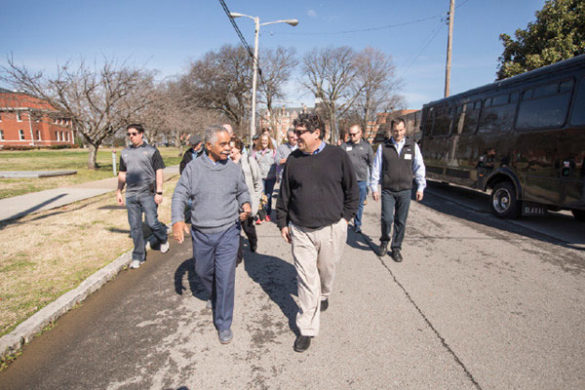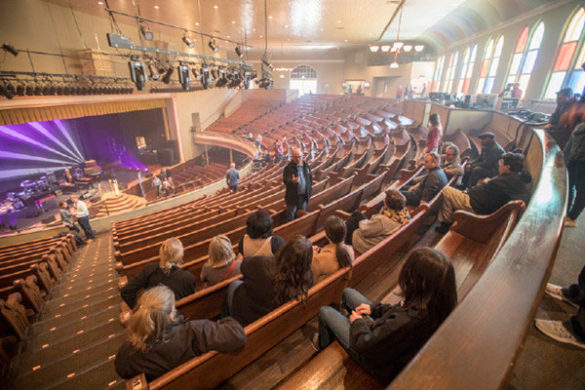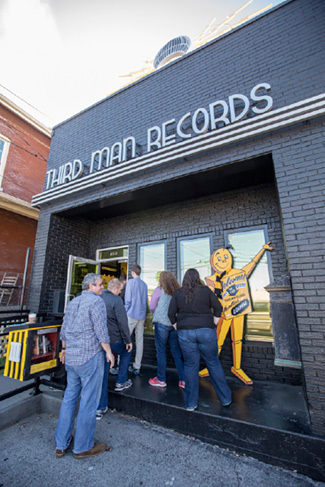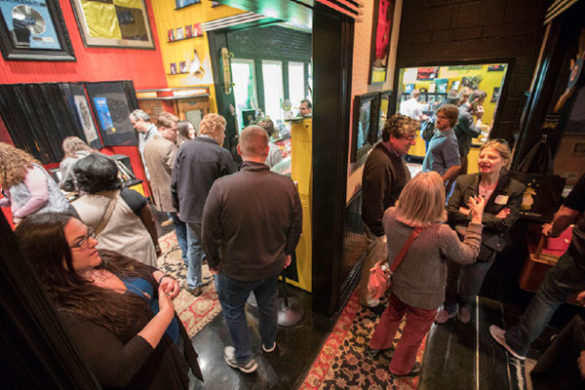
About 30 Vanderbilt staff, students and faculty members spent March 18 learning how Nashville became Music City during the second Chancellor’s Charter tour.
Chancellor Nicholas S. Zeppos hosted the daylong event, the second in his Chancellor’s Charters series. The tours are designed to promote community engagement and lifelong education. The first installment in the series, an interfaith tour of the city, was held Nov. 5.
“The world knows Nashville as Music City, and there is so much to explore about our city’s musical heritage and reputation,” Zeppos said in welcoming the group March 18. “[rquote]We’re are here to learn, to appreciate Nashville’s unique culture, and to be better informed at the end of the day.”[/rquote]
First stop was Fisk University to learn about spirituals, sacred spaces and the Harlem Renaissance. Fisk is home to the Jubilee Singers, who introduced “slave songs” to the world in 1871 and were instrumental in preserving the Negro spiritual music tradition. Fisk history professor Reavis Mitchell spoke about the school’s beginnings and led the group on a tour of several historic buildings on the campus, including Jubilee Hall.
From Fisk, the bus tour traveled down Jefferson Street, the heart of Nashville’s African American community, learning about the area’s musical past and its influence on the early careers of many famous jazz and R&B performers, including Jimi Hendrix and Etta James. Lorenzo Washington, owner of Jefferson Street Sound recording studio, shared the history of several legendary Jefferson Street nightclubs where Hendrix, James and other icons performed during the late 1950s and early 1960s. Little Richard, Ike and Tina Turner, Aretha Franklin, Nat King Cole, Otis Redding, Duke Ellington and Ray Charles were a few of the artists who frequented the area. All but one of the buildings that housed many of the clubs have disappeared, most having been demolished for the construction of Interstate 40 in the late 1960s and early 1970s.
The group visited the Nashville Public Library downtown to learn about the National Museum of African American Music, scheduled to open downtown in 2019. The group learned about NMAAM’s “Rivers of Rhythm” digital exhibit in the main library’s Civil Rights Room before enjoying two performances: Rashad “thaPoet” Rayford of the museum’s Emerging Artist series and Lucius “Spoon Man” Talley, who taught everyone how to play spoons.

Next, the group toured Ryman Auditorium, known as the “Mother Church of Country Music” and home of the Grand Ole Opry for more than 30 years. The world-famous venue’s early history included a variety of music performances, such as Carmen by the Metropolitan Opera in 1901 and the Imperial Russian Ballet in 1912. After a tour of the building and exhibits, Blair School of Music lecturer Robert Fry led a discussion on the significant role that broadcasting played in Nashville’s ascent to its current status as the Third Coast hit-making capital of recording, performing and music publishing.

The last stop was Third Man Records, an independent record label, recording studio and vinyl record pressing distribution center owned and operated by Grammy-winning musician and producer Jack White. The group visited the novelty lounge where some of White’s vintage guitar collection and other music memorabilia are on display, including a 1947 recording booth.
Returning to campus, the group had the opportunity to conclude the day enjoying Chamberfest, an outdoor chamber music festival on Alumni Lawn hosted by the University Concert Bands.
“I really enjoyed learning about the history of Nashville’s music scene alongside other students, faculty and Chancellor Zeppos,” said third-year law student Laura Powell. “This event provided me with a new perspective on the history of Music City and provided one of the most rich experiences I have had since my time at Vanderbilt Law School.”
That is precisely what the day was meant to do.
“The Chancellor’s Charters are intended to provide opportunities to connect Vanderbilt staff, faculty and students with the larger community in new and different ways,” Zeppos said. “I believe it’s important for us to continue learning, to stretch ourselves and to get outside our campus borders so we can engage in dialogue with our neighbors and fellow citizens of Nashville.”
